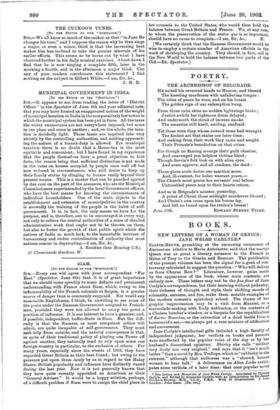MUNICIPAL GOVERNMENT IN INDIA.
[To THY EDITOR OF THE "SPECTAT0R.1 SIR,—It appears to me, from reading the letter of "District Officer" in the Spectator of June 6th and your editorial note, that you may have formed an exaggerated notion of the weight of municipal taxation in India in the comparatively few towns in which the municipal system has been put in force. All the taxes the writer enumerates are not everywhere imposed, but some in one place and some in another ; and, on the whole, the taxa- tion is decidedly light. Those taxes are inquired into very strictly by the controlling authorities, and nothing approach- ing the nature of a transit-duty is allowed. For municipal taxation there is no doubt that a House-tax is the most equitable and convenient; but I have found in my experience that the people themselves have a great objection to that form, the reason being that sufficient distinction is not made in the rates on houses occupied by people once well off but now reduced in circumstances, who still desire to keep up their family status by clinging to houses really beyond their present means. This is a matter that can be guarded against by due care on the part of the assessors, who are the Municipal Commissioners superintended by the local Government officers, who have the best means for knowing the circumstances of individual householders. One of the main objects in the establishment and extension of municipalities in the country is avowedly the training of the people in the habit of self- government. It is, in fact, the only means we have for the purpose, and is, therefore, one to be encouraged in every way, not only to relieve the central authorities of a mass of detailed administrative work that ought not to be thrown on them, but also to foster the growth of that public spirit which the natives of India so much lack, to the lamentable increase of bureaucracy and undue centralisation of authority that most nations concur in deprecating.—I am, Sir, &c.,










































 Previous page
Previous page